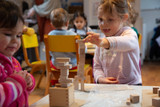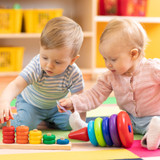Do Montessori kids grow up to be happier adults?
IN THE NEWS: DO MONTESSORI KIDS GROW UP TO BE HAPPIER ADULTS?
Does attending Montessori school in childhood correlate with a higher degree of happiness in adulthood? It just might, suggests a recent study from the University of Virginia (UVA) published in Frontiers in Psychology.
Led by Angeline Lillard, Professor of Psychology at UVA who has researched Montessori methods for more than two decades, the study examined whether three core concepts of Montessori teaching - self-determination, meaningful activities and social stability - lead to a feeling of general wellbeing in adulthood.
Two previous studies led by Lillard found that Montessori students taught by certified Montessori teachers have higher wellbeing while attending school, but no one had looked at whether that translated into long-term benefits in adulthood.
What is wellbeing? The American Psychological Association defines wellbeing as “a state of happiness and contentment, with low levels of distress, overall good physical and mental health and outlook, or good quality of life.” The higher your feeling of wellbeing, the more likely you’ll be happier, healthier and live longer.
For the purpose of this study, the UVA researchers defined 4 factors of wellbeing:
- general wellbeing: happiness, meaning, and a sense of competence
- engagement: seeking challenges in one’s activities and social integration
- social trust: faith in people and a strong sense of community
- self-confidence
They hypothesized that 3 Montessori core concepts might account for higher wellbeing:
- self-determination: children choose their own work, giving them a sense of autonomy)
- meaningful activities: give children a sense of purpose
- social stability: “looping”, which means children are in the same classroom with the same teacher and classmates for 3 years
The researchers recruited 1,905 participants in Canada and the United States, ranging in age from 18-81. About half had attended a Montessori school for at least two years, while the rest had mainly been enrolled in conventional schools. Participants were asked to complete 18 standard surveys that measure psychological and social wellbeing, satisfaction with life, meaning in life, vitality, and mindful attention.
The results suggested that attending Montessori schooling for at least two years was associated with wellbeing in each of the 4 defined factors. When Montessori students were compared to private school students, the Montessori group scored higher in all factors except self-confidence.
The results also showed that the factors of general wellbeing and engagement were “significantly and positively” associated with the duration of Montessori schooling, but social trust and self-confidence were not.
It is important to note that Montessori schools for older children are not as common, so there are limited opportunities to continue beyond age 6 or so, which makes it challenging to determine whether spending more years in a Montessori learning environment has any effect.
In the end, the results showed only an association between Montessori schooling in childhood and higher adult wellbeing, but previous research lends weight to the idea that Montessori has a long-term benefit to wellbeing.
The researchers also speculated whether there was an alternative explanation for the results: Could parental choice play a part? Could higher adult wellbeing come from having parents who went out of their way to find and fund a different school program? Answering those questions was out of the scope of this study, but the researchers felt it would be interesting to explore further.
The report summed up that wellbeing is a multi-determined but very important human outcome. “If childhood schooling were to influence adult wellbeing, the public health implications would be very important”, stated the researchers. Educational environments that support children to become adults with high levels of wellbeing are obviously desirable.
.
Thinkamajigs is a Canadian-based supplier of a wide range of Montessori teaching materials and educational toys. Contact us at 1-800-363-3013 or by clicking here.
LATEST BLOG POSTS
How To Set Up A Montessori Environment At Home
Creating a Montessori-inspired environment at home provides the opportunity to support your child's...
Montessori & Technology: do they play well together?
Dr. Maria Montessori’s method of teaching children emphasizes the use of concrete materials and hand...
Froebel Gifts: An Introduction
You may have heard of Fröebel Gifts (we carry the full selection here), but you may also wonder what...
Safe Toys for Toddlers: What Parents Should Know
As a parent, you want to be sure that any toys your toddler plays with are safe and age-appropriate....
Infant & Toddler Toy Guide - Part 2
THINKAMAJIGS’ GUIDE TO CHOOSING EDUCATIONAL TOYS FROM BIRTH TO AGE 3PART 2: AGE-RELATED DEVELOPMENTA...
Infant & Toddler Toy Guide - Part 1
THINKAMAJIGS’ GUIDE TO CHOOSING EDUCATIONAL TOYS FROM BIRTH TO AGE 3PART 1: SKILLS DEVELOPMENT“What...






